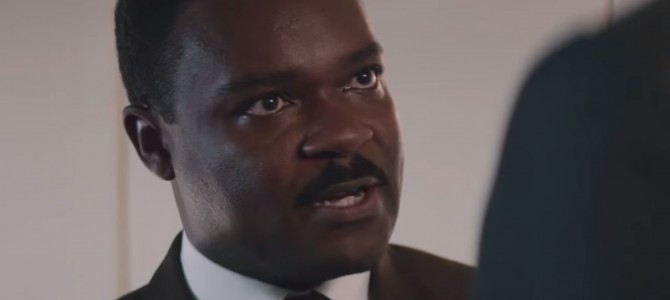
The Martin Luther King Jr. biopic “Selma” succeeds because, like its subject, it stays focused on the big picture even when forced to deal with details. In the process, it tells a great American story about a man who believed in America enough to confront it with its own ideals.
It is not a safe story for any camp, neither for black activists fomenting revolution in Ferguson nor for modern whites who consider racism a thing of the past. King was never safe, and his story could not be either. But it is powerful.
In 1965, protestors staged three marches from Selma, Alabama, to the state capital at Montgomery. The African-American populace wanted a basic American civil right: merely to vote.
Thus King, the spearhead and main figure of the Civil Rights movement, came to town. There he met Americans: young black activists, older folk who had not lost hope, white supporters, black agitators who felt he wasn’t radical enough, and, of course, racist whites prone to violence, self-serving politicians, bullying sheriffs, and cowardly leaders asking for more time.
Portrait of a Leader as a Middle-Aged Man
Director Ava DuVernay serves her subject by weeding out the details of King’s life in order to focus on one central campaign. His childhood, his imprisonment in Birmingham, his “I Have a Dream” speech are all in the past. They may be referenced and may flavor the present, but they are not shown. Nor is the violent end of his story. The film exists solidly in the present.
Instead we see a portrait of the civil rights leader at the height of his influence but also swallowed up in a life that has left him deeply tired. The man who rode into Selma was many things: An unfaithful husband, a counselor to presidents, a subject of J. Edgar Hoover’s Federal Bureau of Investigation spying, a father to little ones, a uniter of factions, a rival of other leaders. All of these things exist simultaneously in “Selma.”
David Oyelowo plays King with weary resolve, calm desperation, and fierce resignation. He is a man who puts one foot in front of the other, day after day, because he can do nothing else. Carmen Ejogo is equally compelling as Coretta Scott King, Martin’s wife. The tension in their marriage is palatable, a thing that can only occasionally be soothed because history refuses to pause to allow them to heal their love. They are painfully divided and yet doggedly loyal to each other.
King is beset from all sides. The local Student Nonviolent Coordinating Committee feels threatened by his presence. One member, a young John Lewis (Stephan James), currently serves in Congress in real life. Malcolm X (Nigel Thatch) lingers nearby with his gospel of violent resistance. However, King also does some besetting of his own. He besieges President Johnson (Tom Wilkinson), using the considerable weight of his influence as a bargaining chip to demand passage of a Voting Rights Bill.
Like King, ‘Selma’ Appeals to American Ideals
If this were all there were to the movie, it would be an interesting exploration of political processes, influence, and leverage.
DuVernay makes it so much more by breathing life into the cause for which King fought. She makes us care about a woman denied a voting card because she could not name all the regional judges (Oprah Winfrey). She shows us an old man hobbling along in the marches, a jolly cook who loves to feed the masses, a passionate young woman running circles around the men. She gives each of them a voice, makes them each a full person. They come from jobs, homes, families, and responsibilities, black and white, in a common search for what is right and decent.
When things get violent, as the wave of nonviolent protestors crashes up against the rock of unrelenting police, DuVernay slows the action, making you feel the injustice of a baton to the head or a gun to the gut. She honors those things that deserve to be honored: King’s faith and sense of God’s purpose as well as the faith of white ministers who joined in solidarity. They, like King, could do nothing else.
Most of all, “Selma” works because it appeals to the idea of America. Unlike Malcolm X, King never turned on America even when it spied on him, jailed him, or spit on him. He knew that the answer was to hold up a mirror to the country, to force it to see the distance between its ideals and its reality. The movie honors his confidence in his country, a confidence that still speaks today.
Do not believe anyone trying to make “Selma” a factional thing, a liberal or conservative, black, white, or hashtag movie. It transcends all that. For all its lofty subject matter, “Selma” is one of the few movies this year that made me tear up. It is one of the best movies of the year and one that will make you believe in the greatness of America.









